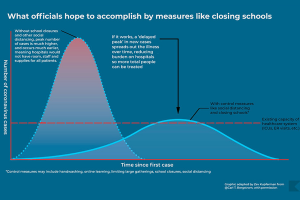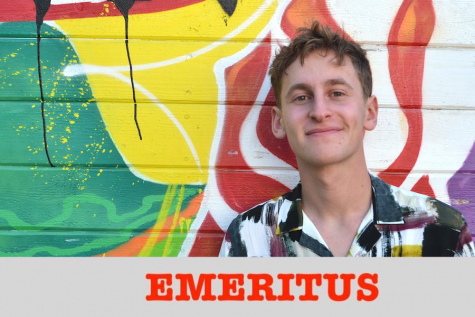YULA student tests positive for coronavirus after Bnei Akiva shabbaton; Rabbi Segal says spread to Shalhevet ‘inevitable’
Hatzolah LA: ‘A large segment of the community has already been exposed’
SPREAD: A van belonging to Hatzolah, whose volunteers provide emergency response in Beverlywood, Hancock Park and other Jewish neighborhoods, was parked on Alta Vista Boulevard yesterday. The group said local Covid-19 patients had interacted widely before being diagnosed.
March 16, 2020
According to a late Saturday email from Bnei Akiva of Los Angeles, a student at Yeshiva University of LA (YULA) Girls High School has tested positive for coronavirus.
Then on Sunday, both Hatzolah of Los Angeles and Shalhevet Head of School Rabbi Ari Segal sent out emails saying the virus, also known as COVID-19, has spread in the community and will inevitably affect all schools.
“Over the past few days, there have been multiple confirmed cases of COVID-19,” stated Hatzolah, a neighborhood volunteer emergency service, which was sent at 11:13 a.m.. “All of these people have had extensive interaction at multiple places, with members of the community.
“Thus, a large segment of the community has already been exposed.”
Rabbi Segal said that this meant it was “inevitable” that cases would reach the Shalhevet Community.
“It seems fairly clear at this point that we will inevitably have cases within the Shalhevet community – students, siblings and/or parents,” Rabbi Segal announced in an email at 4 p.m. today. “Even with all of the social distancing, hand-sanitizing and ‘vampire coughing,’ this is flu-like in spreading quickly between people.”
The Bnei Akiva letter, which was forwarded to the Shalhevet community by Chief Operating Officer Sarah Emerson, also said the YULA student attended a Bnei Akiva Shabbaton last weekend, March 6-8, at the Dovid Oved Retreat center in the San Bernardino Mountains.
This was the second publicized case within the Jewish community after a parent at Harkham Hillel Middle School, who also went to AIPAC, tested positive March 8.
At least 10 Shalhevet students were present at the Shabbaton, and a Shalhevet Institute event led by Rabbi Ari Schwarzberg was held there at the same time.
As of March 15, there were 69 confirmed coronavirus cases in LA County, according to the LA County Department of Public Health website.
The Boiling Point spoke to three Shalhevet students who attended the Bnei Akiva Shabbaton. None was willing to be give his or her name.
But none felt threatened by contact with the YULA patient. One said that she said hello to the student but did not make any physical contact. She did not self-quarantine. Another said they did not interact with the student. Another student didn’t even realize the YULA student was on the Shabbaton.
“To be honest I don’t even remember seeing her there and I definitely didn’t talk to her,” said the Shalhevet freshman.
Still, Hatzolah cautioned that no one has had this virus before, meaning no one has antibodies to it that could prevent them from becoming sick.
“We have witnessed a sudden spike in young adults with flu-like illness over the past 48 hours,” said Hatzolah’s email, which was not signed by any individual. “However, the Department of Health has advised us that ANYONE with a flu-like illness should be presumed to have COVID-19, and further culturing is to stop at this time.
“Culture exposes all health care workers to unnecessary risk and threatens to disable the health care system in place, without adding any benefit,” the email added. “Nobody has antibodies to this virus, and thus according to current modeling the vast majority of people who have been exposed will come down with the illness.”
Bnei Akiva’s email also says that the YULA student attended the American Israeli Public Affairs Committee (AIPAC) policy conference from March 1-3. According to reports, as of March 11, there were already 5 positive cases in North America who were present at the AIPAC conference, including cases in New York, Cleveland and Toronto.
It says the YULA student began experiencing symptoms on Thursday March 12, 10 days after AIPAC and 5 after the Bnei Akiva – Shalhevet Institute shabbaton. According to the CDC, the typical coronavirus incubation period is five days, so it is somewhat more likely that the YULA student caught the virus from someone on the Shabbaton than on AIPAC, though either is possible.
Bnei Akiva had been notified that their participants were not at risk of contracting the virus, according to the email..
“YULA has been told by the Acute Communicable Disease Bureau heading the COVID-19 Response Team that there is a low risk of exposure, however we cannot say anything more definitive at this time,” stated the email.
It is also still unclear how many days prior to symptoms showing an individual can be contagious, but the CDC says on its website that this is possible.
“Some spread might be possible before people show symptoms,” the CDC says on its “How COVID-19 Spreads” page. “There have been reports of this occurring with this new coronavirus.”
A March 8 study of a cluster of coronavirus patients in Singapore concluded that 48% of patients contracted the disease from a pre-symptomatic carrier.
The Bnei Akiva email says that the YULA patient is not very ill.
“Baruch Hashem her symptoms are mild and she is feeling well at this time,” stated the email from Bnei Akiva president Ruth Berkowitz.
“The onset of her symptoms was on Thursday, March 12, and she tested positive over the weekend. She will be in isolation and the family will be in quarantine over the next 14 days.”
The identity of the YULA student is known to Shalhevet students but was not mentioned in Bnei Akiva’s letter.
















